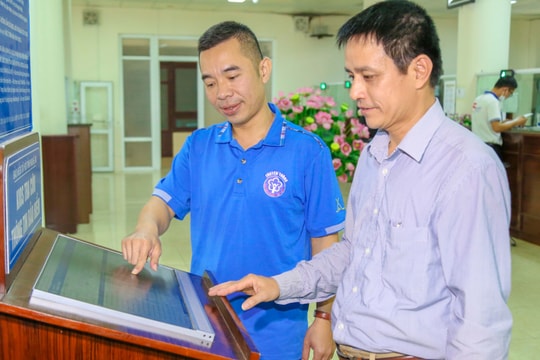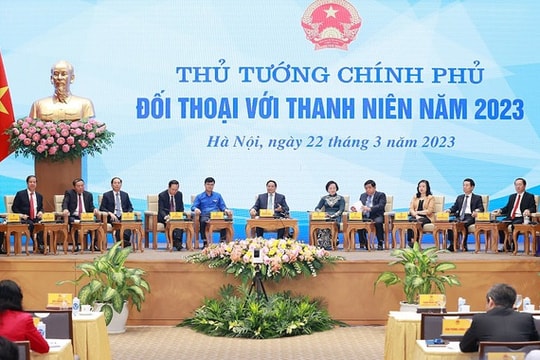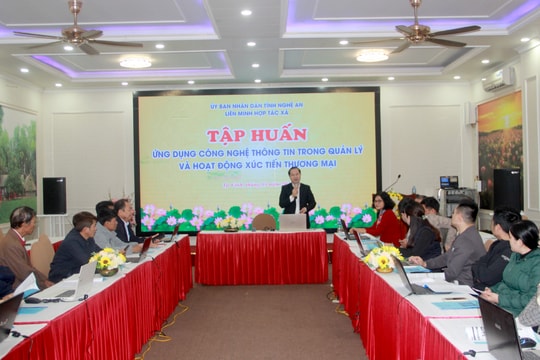Lessons from Singapore's digital transformation 'miracle'
(Baonghean.vn) - Singapore is considered a "miracle" in the field of digital transformation. This small country has risen to become one of the world's leading countries in applying technology in all areas of life.

Digital transformation is a process of comprehensive and overall change of individuals and organizations in the way of life, work and production methods based on digital technologies. It includes the application of technology to all aspects of social life, from government, businesses to people.
Digital transformation is not simply about using technology to automate existing manual processes, but also about changing the way we operate, think and culture to maximize the potential of technology.
To successfully implement digital transformation, close coordination between stakeholders, including the government, businesses and people is needed. It is necessary to develop a national strategy on digital transformation, while investing in technology infrastructure, developing human resources and raising public awareness of digital technology.
Singapore has long been known as a pioneer in the field of digital transformation. With strategic vision and thorough investment, this country has achieved great achievements in applying technology to all aspects of social life, from government, businesses to people.
In addition, the country has also been deeply aware of the importance of keeping up with the latest digital trends to maintain its competitive edge. Therefore, Singapore has been actively pursuing a comprehensive digital transformation journey across many areas of the economy and society.
Additionally, Singapore also integrates technology and digital solutions into various aspects of government, business, education, healthcare and other sectors to improve efficiency, innovation and overall quality of life.
To achieve success in the digital transformation process, Singapore has proposed and implemented a series of initiatives and solutions to make the country one of the leading countries in the world in digital transformation.
Smart Nation Initiative
Singapore has recognized the importance of technology in driving economic and social development. The government has developed a comprehensive national strategy for digital transformation, with the aim of transforming Singapore into a smart nation where everyone can take advantage of the benefits of technology.
The Smart Nation Initiative was launched by the Singapore Government in 2014 with the goal of turning Singapore into the world's first smart nation by 2020. The initiative focuses on using technology to improve the quality of life for its citizens, improve government efficiency and drive economic development.
The Smart Nation initiative is the way forward for Singapore where technology will be so seamlessly integrated that it will transform the way we work, live and play. To achieve the goal of this initiative, the 3 pillars of Singapore’s Smart Nation are: Digital Government, Digital Economy and Digital Society.
Accordingly, Singapore's Digital Government continues to invest in infrastructure and create open, shared platforms for businesses and citizens to learn and grow.
Meanwhile, the digital economy takes advantage of the latest technology to digitize processes and drive business growth. This attracts foreign investments, thus creating new jobs and opportunities for those in Singapore. At the same time, it encourages businesses to invest in technology and digital talent to encourage growth.
Singapore’s digital society empowers everyone to have a fair chance at success regardless of their differences or circumstances. It inspires Singaporeans to dream bigger, as Singapore becomes more connected to the world through technology. Whether young or old, tech-savvy or not, the aim is for every Singaporean to benefit from technology.
In addition, Singapore's digital society also enables individuals to hone their talents and equip themselves with the latest digital technologies to realize their greatest inspirations and live better lives together.
Promoting e-government and improving the quality of public services
Many Singaporean government agencies are digitizing their services and processes to make them more accessible and convenient for citizens. Initiatives such as the personal data management platform “MyInfo” allow citizens to access and use their personal data for various transactions.
MyInfo is a personal data management platform developed by the Singapore Government to simplify the process of sharing personal information between government agencies and authorized organizations. This platform allows Singaporeans to provide personal information to the government only once, which can then be used to access online public services quickly and conveniently.
Singapore citizens can now authenticate their data on MyInfo through the national e-identity login and authentication system Singpass. Singpass allows Singaporeans to use a single account to log in to more than 400 online services from the government and authorised organisations.
Digitizing citizen information through the MyInfo portal helps speed up the Know Your Client (KYC) process and reduce cumbersome manual paperwork. It also brings greater accuracy and reduces the possibility of errors in user data.
MyInfo is a prime example of using technology to improve the quality of public services and enhance the efficiency of government operations. This platform has contributed significantly to Singapore's digital transformation.
Innovation in Fintech
Singapore is a global leader in financial technology (Fintech) innovation. Thanks to its favorable environment, supportive policies and dynamic Fintech ecosystem, Singapore has attracted many Fintech startups and large financial corporations in the world.
Singapore has fostered the growth of Fintech startups and encouraged innovation in areas such as e-payments, blockchain and digital banking. Regulatory frameworks have been established to support these efforts.
The Monetary Authority of Singapore (MAS) plays a key role in fostering Fintech growth by creating a progressive regulatory framework that encourages innovation while ensuring consumer rights and financial stability.
Promoting the development of health care and telemedicine
Singapore's healthcare sector is also witnessing digital transformation efforts, including the rollout of electronic health records and expansion of telemedicine services, which are particularly relevant in the context of the COVID-19 pandemic.
Many platforms and applications have been launched to facilitate remote medical consultations. These platforms allow patients to connect with medical professionals via video call, chat or phone call. Common applications of telemedicine in Singapore include general medical consultations, prescription renewals, mental health support and follow-up visits for chronic conditions.
The government has taken steps to regulate and support the growth of telemedicine while ensuring patient safety and data privacy. The Ministry of Health (MOH) has issued guidelines and regulations to regulate the practice of telemedicine, ensuring that healthcare facilities maintain high standards of care even in remote environments.
Investing in transport infrastructure
Singapore has been actively working to improve its transport infrastructure and leverage the latest digital trends to remain at the forefront of innovation. The country has pursued initiatives to improve transport efficiency, reduce congestion, and improve the overall travel experience for residents and visitors.
These efforts have so far yielded significant results. Today, Singapore is famous for its Electronic Road Pricing (ERP) system, which uses electronic toll collection to manage road congestion by charging vehicles to use busy roads during peak hours. This helps control traffic flow and reduce congestion.
The implementation of contactless fare payment systems, such as Singapore's version of Visa payWave and Mastercard PayPass, has made it more convenient for passengers to use buses and trains.
In addition, the Land and Transport Authority (LTA) has also collected and analysed a large amount of traffic data to make informed decisions on infrastructure improvements, traffic management and urban planning.
Promote the application of new management systems in the digital transformation process of enterprises
In addition to implementing initiatives and solutions in the digital transformation process, Singapore has encouraged and promoted businesses to apply new management systems such as Enterprise Resource Planning (ERP) and Customer Relationship Management (CRM) in their operations.
In which, ERP system is an integrated software that helps businesses manage core business activities such as finance, accounting, human resources, production, supply chain and sales.
In Singapore, ERP systems are widely used by businesses of all sizes. Large enterprises often use ERP systems from international vendors such as SAP, Oracle and Microsoft Dynamics. Small and medium enterprises often use ERP systems from local vendors such as Acumatica, Epicor and Syspro.
The integration of ERP systems has contributed significantly to the digital transformation of businesses in Singapore. The system plays a pivotal role in digital transformation by providing a central platform to manage various aspects of organizational operations such as finance, human resources, supply chain, inventory, sales, etc.
As for CRM System, it is a useful tool for businesses, helping to manage both interactions with current and potential customers.
The fundamental strategy of CRM revolves around collecting, organizing, and analyzing customer data, all with the goal of improving customer satisfaction and loyalty, while boosting overall business performance.
Putting this system into action often involves a combination of cutting-edge technology and data-driven strategies, all aimed at improving customer interactions, simplifying operational processes, and improving overall business efficiency.
In Singapore's innovation journey, most businesses have leveraged CRM systems to improve operational efficiency.
In short, Singapore’s success in digital transformation is a testament to the importance of clear strategic planning, sound investment and an environment conducive to innovation. Any country or government that wants to succeed and maintain its competitive position needs to make the most of emerging technologies and innovative trends.
Digital transformation in Singapore is taking place across almost every sector, from government infrastructure to e-commerce, and is growing rapidly. Businesses are now turning to ERP and CRM systems to improve organizational capabilities and gain better visibility into their operations.






